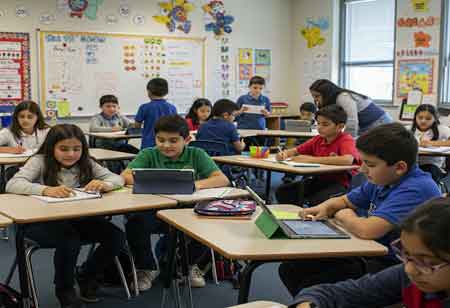THANK YOU FOR SUBSCRIBING
Be first to read the latest tech news, Industry Leader's Insights, and CIO interviews of medium and large enterprises exclusively from Education Technology Insights
Redefining K-12 Education in APAC
The K-12 education sector in the Asia-Pacific (APAC) region is driven by innovative solutions encompassing diverse technological tools,

By
Education Technology Insights | Wednesday, May 07, 2025
Stay ahead of the industry with exclusive feature stories on the top companies, expert insights and the latest news delivered straight to your inbox. Subscribe today.
The K-12 education sector in the Asia-Pacific (APAC) region is driven by innovative solutions encompassing diverse technological tools, digital content, and pedagogical support systems, fundamentally altering the learning delivery method and experience for millions of students. The region is witnessing the development of an ecosystem of providers addressing varied educational needs across multiple economies, facilitating a pivotal shift from traditional paradigms to modern, technology-enabled learning environments. This evolution reflects a strong momentum towards digitalization, personalization, and readiness for the future of education.
A primary driver is the ambitious digital transformation agendas led by governments across various countries. These often involve significant public investment in educational technology infrastructure, national digital learning platforms, and policies to integrate technology into curricula. In parallel, the increasing prevalence of internet connectivity and the widespread adoption of digital devices, such as smartphones and tablets, create a conducive environment for the proliferation of digital learning solutions. This improved accessibility enables educational content and platforms to reach a broader population of students, including those in remote or underserved areas.
Evolution of Pedagogical Approaches
The emergence of new technologies accompanies a significant evolution in pedagogical approaches. A central theme is personalized learning, with solutions increasingly designed to move beyond a one-size-fits-all model toward individualized learning pathways that accommodate diverse learning styles, pacing, and interests.
Blended learning, which integrates face-to-face instruction with online components, is gaining substantial acceptance. This model offers flexibility and provides a customized learning experience by leveraging the strengths of both traditional and digital methodologies. There is a noticeable shift toward student-centric learning, emphasizing active participation, inquiry-based exploration, and the cultivation of critical thinking skills. Collaborative project-based learning, facilitated by digital tools, is also becoming more prominent, fostering teamwork and real-world problem-solving.
A noteworthy recent development is the heightened focus on Social-Emotional Learning (SEL). K-12 solutions are beginning to incorporate components that support students in developing self-awareness, self-management, social awareness, relationship skills, and responsible decision-making, thereby recognizing the importance of holistic development.
The Shifting Landscape of Content and Curriculum
The nature of educational content is experiencing a profound transformation. Interactive digital content progressively supplemented or supplanted traditional static textbooks. This transition encompasses multimedia resources, simulations, educational videos, and interactive modules that enhance engagement and accessibility. Solution providers prioritize creating high-quality, curriculum-aligned digital resources that can be readily updated and customized.
There is a strong emphasis on integrating essential 21st-century skills into curricula. This often involves incorporating elements of computational thinking, coding, data literacy, and digital citizenship into various subjects. The focus on STEM (Science, Technology, Engineering, and Mathematics) and STEAM (including Arts) education is intensifying, supported by specialized digital tools and content. Furthermore, efforts are underway to develop multilingual and culturally relevant content that addresses the needs of the diverse student populations across the APAC region.
The Role of Data in Shaping Educational Journeys
Data analytics is emerging as a powerful instrument within the K-12 solutions ecosystem. Educational platforms are increasingly adept at collecting and analyzing vast amounts of data related to student performance, engagement, and learning behaviors. These insights prove invaluable for educators, enabling them to monitor student progress in real-time, identify learning gaps, and discern areas where students may struggle or excel.
This data-driven approach facilitates more informed instructional decision-making, empowering teachers to effectively tailor their strategies and interventions. At the institutional level, analytics contribute to curriculum adjustments, resource allocation, and overall improvements in educational delivery. Moreover, data is growing in enhancing administrative efficiency within schools, streamlining admissions, attendance, and reporting processes.
Solution providers recognize that the successful integration of technology in education hinges on empowering educators. As a result, a significant portion of the K-12 solutions market is dedicated to equipping teachers with the necessary tools and support. This includes intuitive lesson-planning platforms, digital content creation, automated grading, and assessment design.
Online professional development platforms and resources are becoming increasingly prevalent, offering teachers flexible opportunities to enhance their digital literacy, learn new pedagogical techniques, and share best practices with their peers. Technology can alleviate teacher workloads by automating specific administrative tasks, allowing them to devote more time to direct student interaction and personalized instruction.
Investment and Market Dynamics
The K-12 solutions sector in APAC continues to attract significant investment, reflecting its high growth potential and the perceived importance of educational technology. Such investment fuels innovation, supports the scaling of practical solutions, and encourages the entry of new providers with specialized offerings. The market showcases various players, from established educational publishers adapting to digital formats to agile technology start-ups. A notable trend is the movement towards comprehensive, integrated solutions that address multiple facets of the educational process, rather than standalone point products.
Governments across the region are pivotal in shaping the K-12 solutions landscape. Many have established national digital education policies and strategic roadmaps to guide technology integration into schools. Public investments are directed towards developing digital infrastructure, including providing schools with internet connectivity and devices.
The K-12 solutions industry in APAC is on a robust upward trajectory, characterized by continuous innovation and broader adoption. The digital transformation of education is well underway, with a sustained focus on making learning more personalized, engaging, equitable, and effective. The ongoing integration of emerging technologies such as AI, data analytics, and immersive experiences is anticipated to redefine the educational landscape further. Providers will likely refine their offerings, prioritizing solutions that not only deliver academic content but also foster critical skills and support the holistic development of students.
The K-12 solutions industry in the APAC represents an essential sector, serving as a key enabler of educational advancement. Through technological innovation, evolving pedagogical practices, supportive government policies, and sustained investment, solution providers are making significant contributions toward preparing students for future complexities. As these solutions become more sophisticated and integrated into educational practices, they promise to create more engaging, effective, and equitable learning opportunities for all students across this diverse region.
I agree We use cookies on this website to enhance your user experience. By clicking any link on this page you are giving your consent for us to set cookies. More info

However, if you would like to share the information in this article, you may use the link below:
www.educationtechnologyinsightsapac.com/news/redefining-k12-education-in-apac-nid-3192.html






